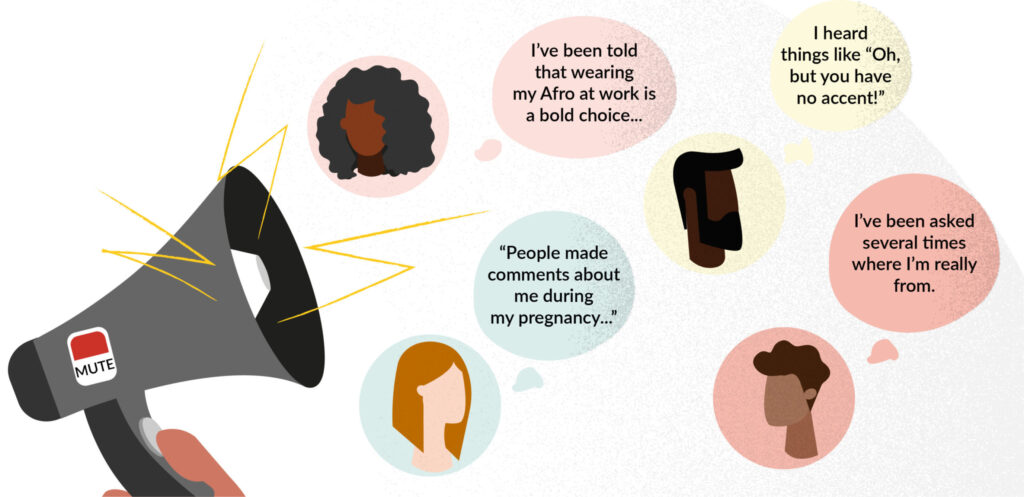What to do when you witness a microaggression at work: Advice on being an ally rather than a bystander in the workplace
‘Microaggressions are the everyday verbal, nonverbal, and environmental slights, snubs, or insults, whether intentional or unintentional, which communicate hostile, derogatory, or negative messages to target persons based solely upon their marginalized group membership.’ – Derald Wing Sue via NYTimes
As allies, we recognise our responsibility towards people from marginalised groups, in the knowledge that our voices are powerful and can be used for justice. Allyship also requires action when we see discrimination, so that it is not merely performative. But this is not easy and like any skill, it takes time to grow your confidence doing it! It is okay not to know what to do or say, as long as we are making the most active effort we can to find a resolution and create justice at work.
Recognising Microaggressions
Microaggressions are slight, indirect and hostile. They are incredibly common, but usually much harder to spot than other kinds of aggression, and they’re not just in the workplace. Campaign Asia have a great example of microaggressions in action which we recommend taking a look at! Whether they’re muttered under someone’s breath in a lift or bold statements in a meeting, they are everywhere and can often slip right past us.
But all microaggressions are always discriminating against a part of someone’s identity. As microaggressions can be harder to recognise, it can also lead people who have been targets of microaggressions to second guess them. HBR explains that the effect of microaggressions builds over time, affecting physical and mental wellbeing with research suggesting that ‘microaggressions are at least as harmful as more overt expressions of discrimination.’
So here are a few starting points related to what we can do.
Say something
You might have heard the phrase ‘silence is complicity’ more frequently since the beginning of the pandemic, especially in association with the rise of the Black Lives Matter movement in 2020. Whilst many of us have experienced growth in our understanding of the prejudice and discrimination occurring around us and actions we can take as allies, it is okay not to know what to do. But the most harmful thing we can do is to do nothing.
The Australian campaign Doing Nothing Does Harm illustrates the effect of our silence in this campaign video and is a great starting point to understand how our silence does more harm than good.
Acts of discrimination are intended to outcast people, making them feel isolated and lonely. As allies, we can act most simply by speaking out against the offence and letting those who have been discriminated against know that we’re there to support them.
- Respond as calmly and directly as you can
- Intention & Impact – highlight that while ‘it might not have been the intention’ the impact of what they said can create negative effects for others
- Stay away from name calling – when we start labelling people with terms like ‘misogynist’, it heats up the situation and causes people to become defensive
- Create an opportunity for learning and growth – explain why what they said was wrong, avoiding future microaggressions. If you aren’t able to explain it in the moment, make sure to address it at a later stage
- Think about immediacy – our knee jerk reaction isn’t always the most helpful, sometimes it is worth taking a moment to process before responding
- Listen to how the recipient of the microaggression feels as well – don’t assume or let your bias colour the situation
Outward support
As allies – or even just co-workers – we should be conscious of the ongoing impact of microaggressions. Unfortunately, their effect isn’t always resolved once the situation is, so let’s make sure our compassion continues after the microaggression has occurred.
- Talking to the victim of a microaggression just after the incident lets them know that they’re not alone and that the pressure to resolve this is not all on them if they don’t want it to be
- It also validates what happened and their feelings about it – when we are silent we deny what occurred
- Emotionally, it gives them more room to think and process an incident
- We can offer them our support in how to deal with it – helping them come to a decision about what works best and how it would affect them
- Being aware of company policies/best practices to deal with microaggressions and making these clear as possible options for action
Allyship is an ongoing effort for all of us. It requires commitment and continuous learning about different communities and how we can be the best ally to each other as possible. This is not easy and progress takes time. At NKD, we recognise that the more we consciously try, the stronger our practices become, creating safer and healthier workplaces for everyone – make your voice count!
